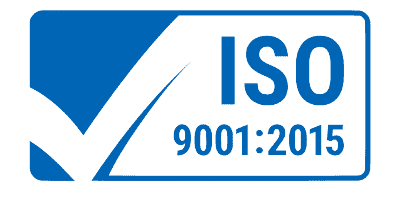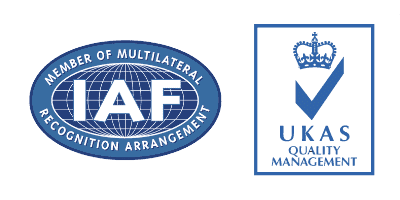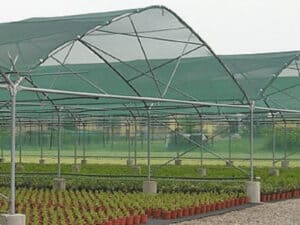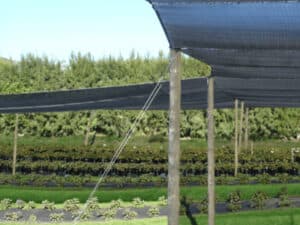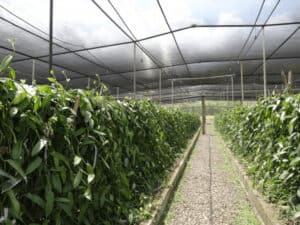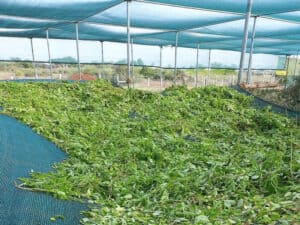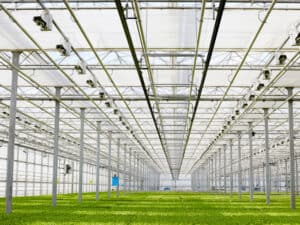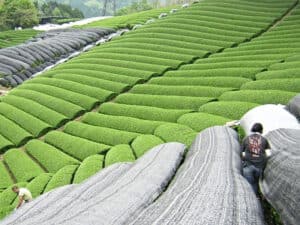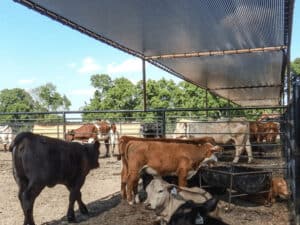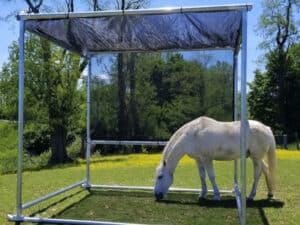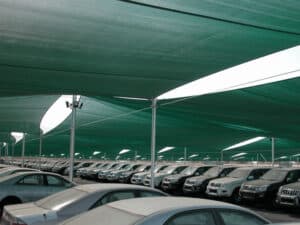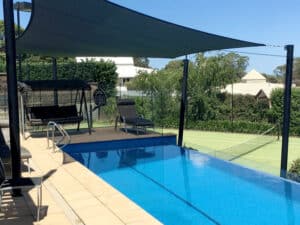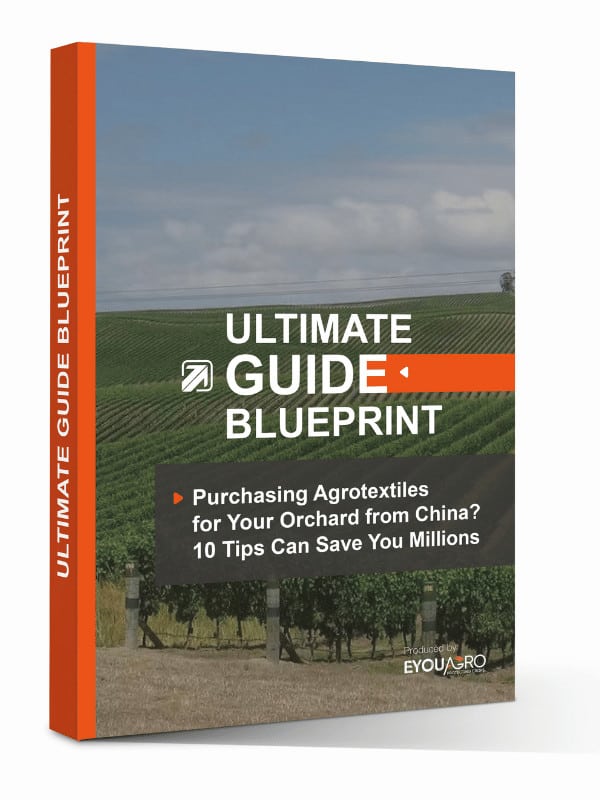Aluminet
Control the Microclimate of the Greenhouses and Nurseries through Moderating the Temperature, Ensuring Proper Ventilation, and Light Diffusion.
The Best Choices for Covering Your Garden or Greenhouse.
EyouAgro’s Aluminet is a premium quality pure HDPEmetalized screen employed to reflect the unwanted long-wavelength infraredradiations.
- UV-resistant
- Lightweight, and easy to handle
- Longevity: Resistant to oxidation, and UV rays
- Premium-quality, laboratory tested totestify
- Proper light distribution
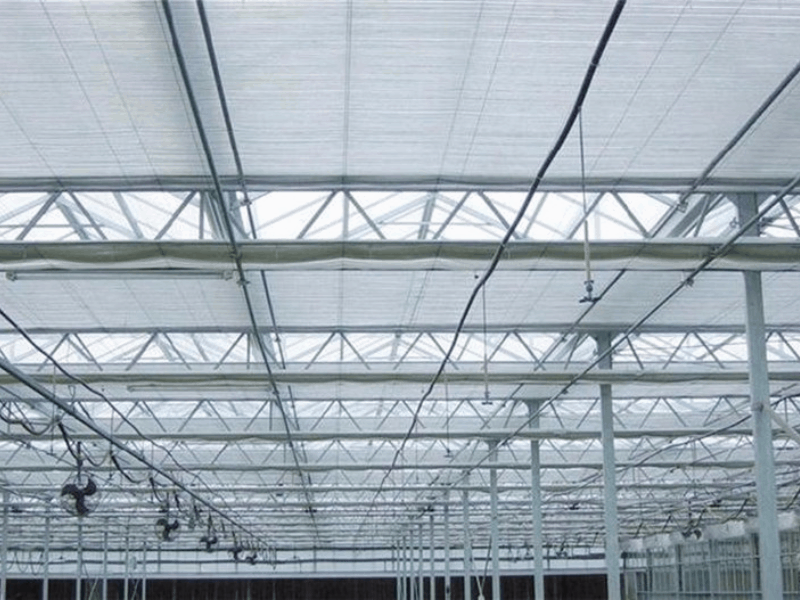
To make sure you can find the information you want quickly,
we have prepared this content directory that will jump to the corresponding location when you click on it.
Shade cloth has the following wide range of applications , Inquiry us for more solution.
Find the rights Aluminet below for your greenhouse; All of our products are provided with up to 5 years warranty.
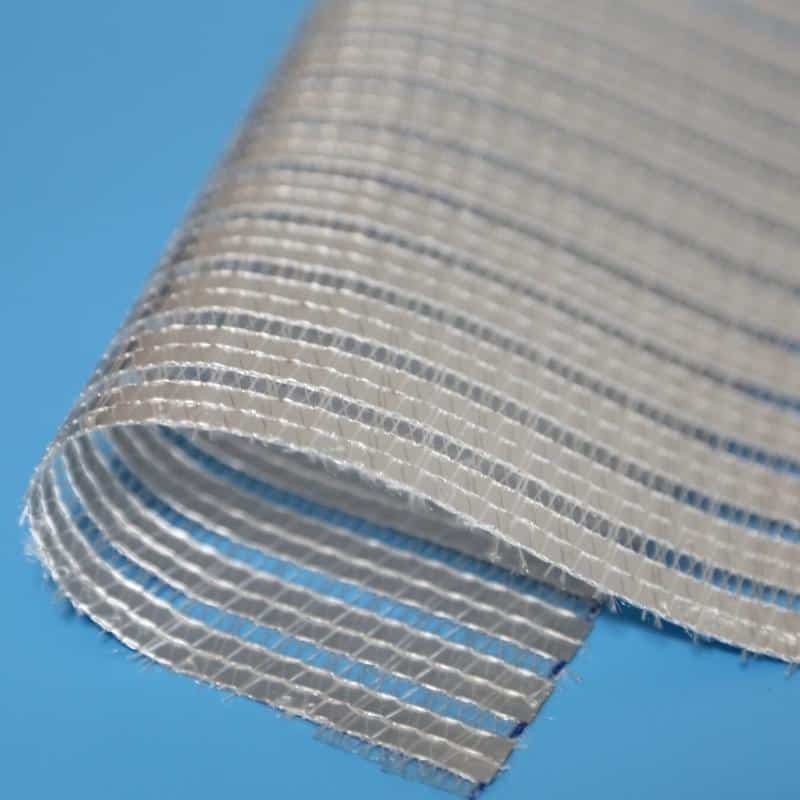
40% shading allows 60% light transmission.
40 Aluminet Shade Cloth is a premium quality pure HDPE metalized screen employed to reflect the unwanted long-wavelength infrared radiations.
- Raw Material: polyester 40% ,Aluminum 30%,PET30%
- Shade Factor: 40%
- Energy Saving: 20%
- Application: Indoor
- Standard width: 4.30m and 5.30m
We will contact you within 1 working day, please pay attention to the email with the suffix “@eyouagro.com”.
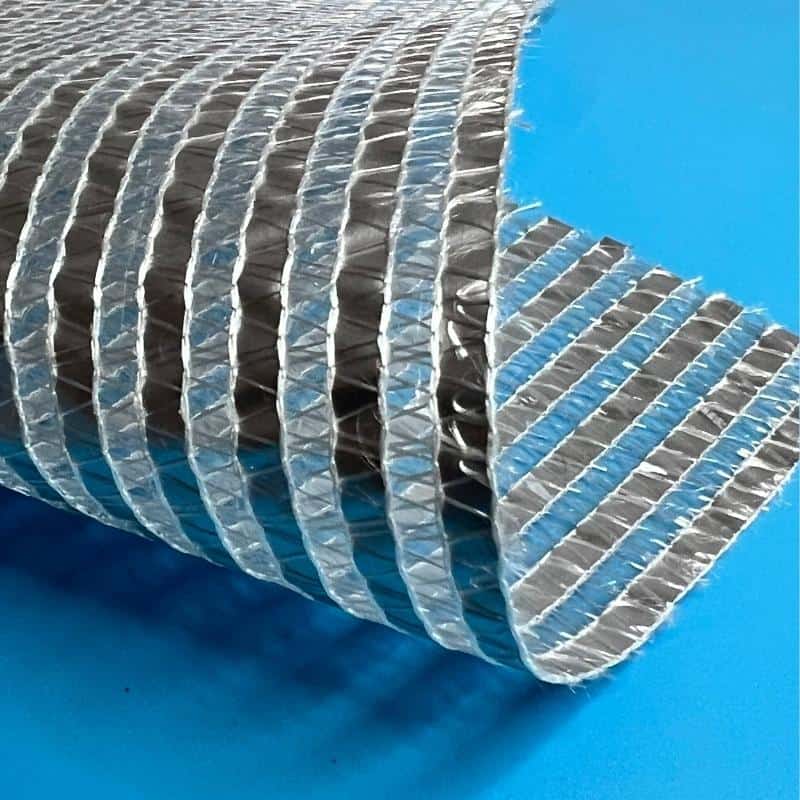
50% shading allows 50% light transmission.
The 50 Aluminet is designed especially for internal use to be spread permanently as a ceiling beneath greenhouse roofs, or to be installed as a moveable thermal screen.
- Raw Material: polyester 50% ,Aluminum 50%,
- Shade Factor: 50%
- Energy Saving: 25%
- Application: Indoor
- Standard width: 4.30m and 5.30m
We will contact you within 1 working day, please pay attention to the email with the suffix “@eyouagro.com”.
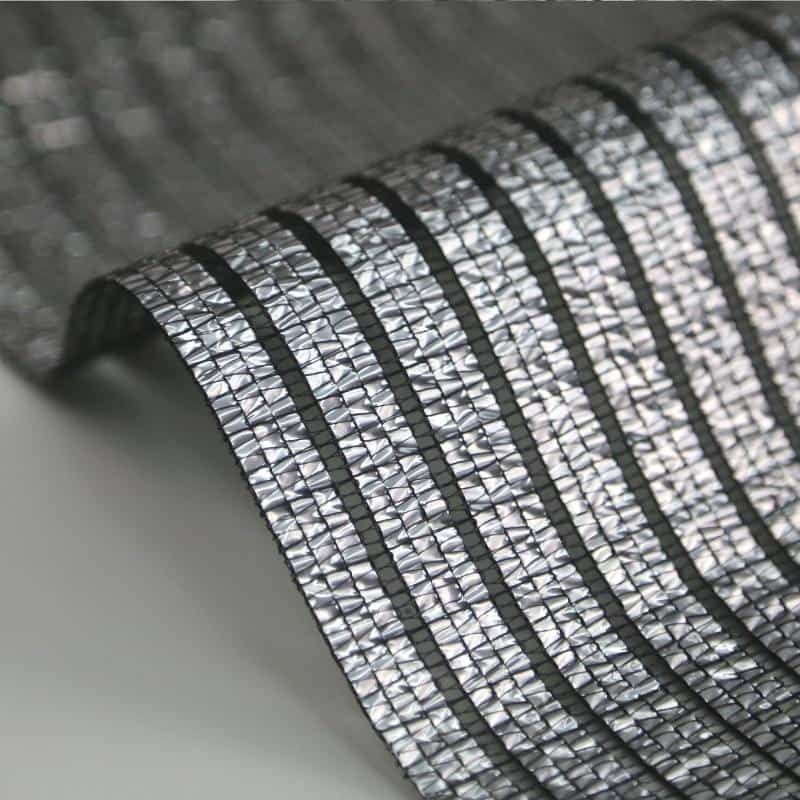
70% shading allows 30% light transmission.
The 70% Aluminet Shade Cloth is the maximum cooling ability. It makes this the perfect solution for shading greenhouses.
- Raw Material: Polyethylene 60% ,Aluminum 40%,
- Shade Factor: 75%
- Energy Saving: 67%
- Application: Outdoor
- Standard width: 4.30m and 5.30m
We will contact you within 1 working day, please pay attention to the email with the suffix “@eyouagro.com”.
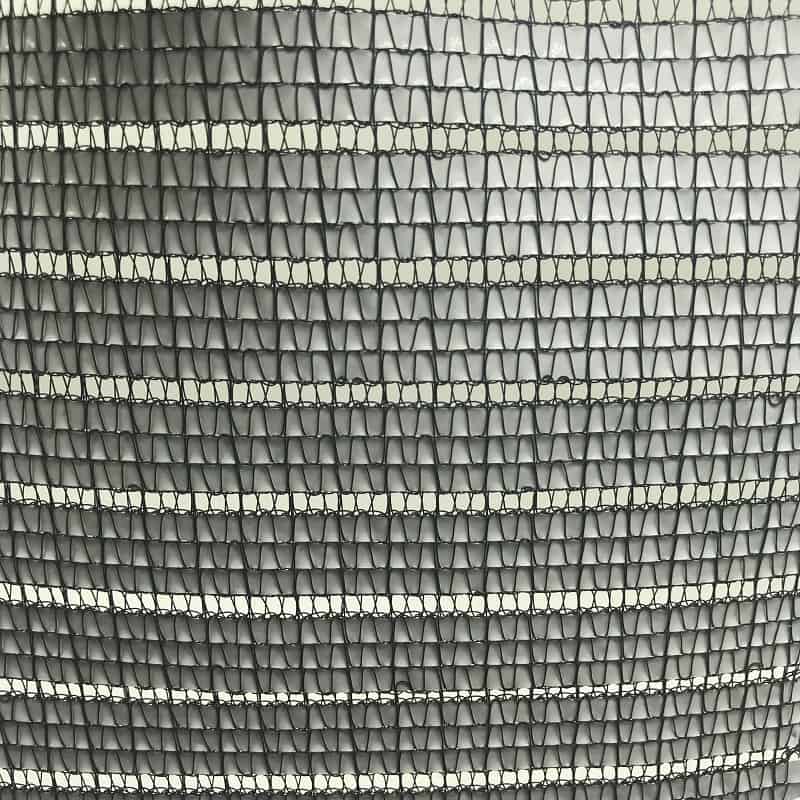
80% shading allows 20% light transmission.
With the EyouAgro 80% Aluminet Shade cloth, you can maintain greenhouse temperature 9-14 percent lower than the surroundings.
- Raw Material: Polyethylene 62% ,Aluminum 38%,
- Shade Factor: 80%
- Energy Saving: 70%
- Application: Outdoor
- Standard width: 4.30m and 5.30m
We will contact you within 1 working day, please pay attention to the email with the suffix “@eyouagro.com”.
No matter if you are looking for a wholesale supplier or if you need a custom-made Aluminet , we can all help.



I like buying from Chinese company like yours.

Founded in 1996, EyouAgro uses Knitted and Woven technology to design, develop and manufacture Agriculture Protection Textiles.
EyouAgro offers clients a wide choice of standard and customized Polymer Netting for their farm or orchard needs.
Keeping the plants protected from adverse weather conditions!
EyouAgro has a significant Aluminet shade cloth manufacturing capability.
- Certified by ISO9001, REACH, Rohs, SGS certification.
- Automated Raschel production line, create over 10,000sqm per day.
- Manufacture directly, large scale production and Well trained workers.
Whether you need Aluminet Shade Cloth or need to custom any netting products.
EyouAgro always satisfies your needs.
The density of the material varies from nearly 30% to 90%. If you use the netting consistently, most of the moderate density Aluminet should last at least 4 years.
Again, usage and maintenance are the two most important determinants for the lifespan of Aluminet.
Aluminet is available in a variety of shades. But, the color you need for your field depends on the purposes you wantit to serve.
However, a general guideline on findingthe right color is:
1. The white color is the most effective asit reflects most of the sunlight and UV rays back into the atmosphere.
2. Darker colors in regions more prone tocold temperature.
3. Colors such as red are used for plantslike Philodendron that increase the number of leaves.
4. Other colors such as Blue seem to affectthe growth of plants such as Orchid positively, more so than under the effectof black and red color Aluminet.
5. Black color increases the number ofleaves of the cast iron plant.
6. Lettuces have the highest length andwidth under red shading as compared to green.
7. Some plants are not evenaffected by the color of the Aluminet such as Peaches, their growth rate is thesame under different color Aluminet.
The main usage of Aluminet is to provide shade. Nonetheless, it can be also used for protection against worm-carryingbirds. This consequently decreases the need to use pesticides and other chemicals.
The superiority of the EyouAgro Aluminetis that the material is flexible, so, it can be used in humid regions becausethe fabric can ‘breathe’.
Also, the open weave build of the aluminet ensures better ventilation, lowers the humidity near plants and reduces themoisture condensation on plants.
A mixture of different Aluminet will behighly useful for your problem, as the material comes in different grades aswell as different densities.
If you are growing a heat-resistant plantin a region with constantly changing weather, then you will need a lowerdensity Aluminet during the start of periods of sunlight and later on, when itstarts to get colder resulting in less heat, a higher density Aluminet for heatretention.
However, the process of netting choicewill be done in reverse order if you are growing plants prone to damage by heat.
You can use a 70% shading net, it will protect in low to moderate pressure situations from the rain, however, you cansend us your requirement and you will receive a detailed outline for solving your problem. It is to be noticed here that it will not stop rain from getting in, it would just not get damaged from the rain.
We personally would advise you toseek professional help with all deployment and maintenance of the Aluminet,nonetheless, if you wish to do it yourself, then sharpened and high-gradescissors can be used. It is advised that two people try to cut the netting asit can easily become difficult for one person.
The dependence of the density percentage depends on the environment and plants which you are growing. Orchids and ferns which love shade are mostly protected by high shade Aluminet whereas Lemon plants that have high heat tolerance can easily be managed with low-density Aluminet. Lemon plants that have high heat tolerance can easily be managed with low-densityAluminet.
Again, it depends on the type of Aluminet you use, however, studies have consistently shown that a normal density Aluminet, within the density range of 40%-50%, will provide at least a10-20 degree decrease if you place it properly.
We are glad you thought of that,protecting cars from sunlight by using Aluminet is one of the more unconventional usages of the Aluminet. It sure works and it is highly pragmatic to think like that. EyouAgro can deliver custom-made Aluminet for your cars as well.
The Smart Way To Protect Your Greenhouse from Adverse Weather.
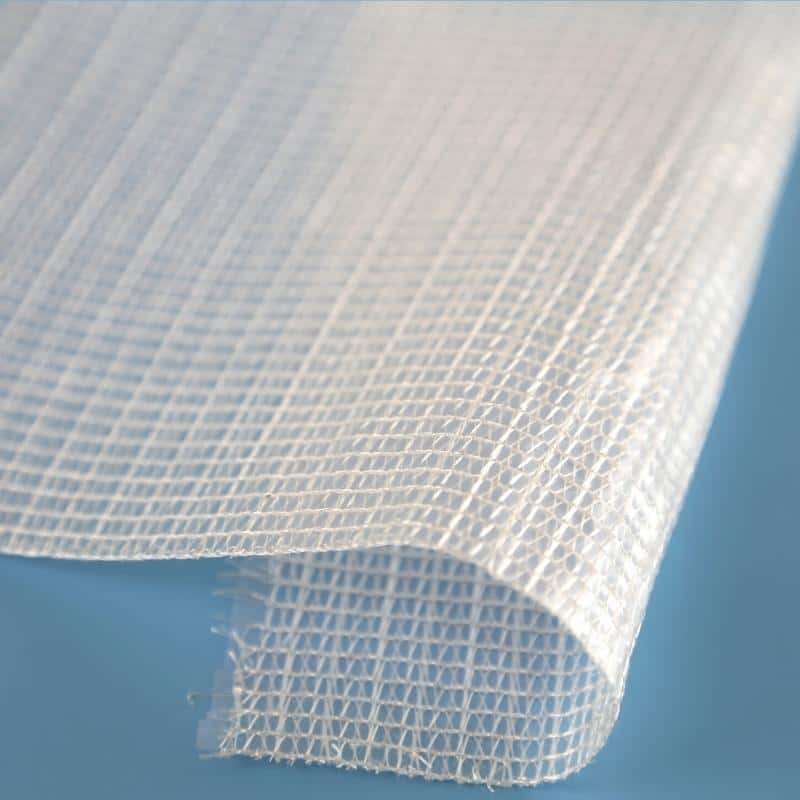
Transparent Energy Saving Screen ( TES), is an innovative solution to increase light transmission and heat retention to save energy both day and night for your greenhouse.
EyouAgro have been the professional Transparent Energy Saving Screen manufacturer in China for more than 10 years.
It is manufactured with High-Strength and eco-friendly polyester yarn and PET film by knitted structure.
We will contact you within 1 working day, please pay attention to the email with the suffix “@eyouagro.com”.
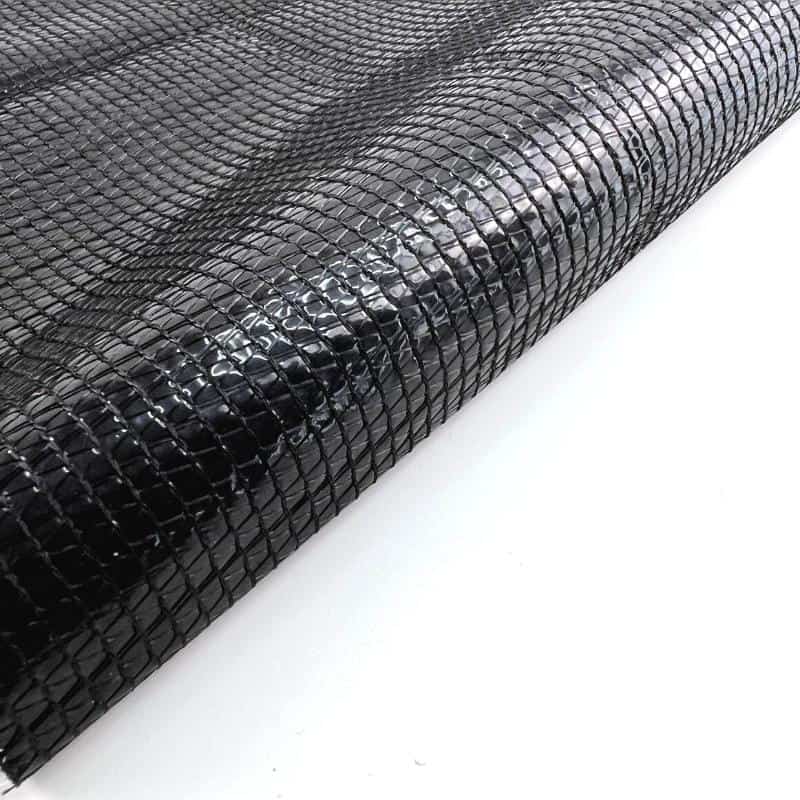
Blackout Shading Screen (BSS), also called Darkening Screens or light deprivation Screen, is made of aluminum foil and polyester material through a special process, with good shading effect, the shading effect can reach 99.9%.
Provides the dark environment needed by special plants such as gerbera, Hemp, and Cannabis. Shorten the duration of sunlight.
We will contact you within 1 working day, please pay attention to the email with the suffix “@eyouagro.com”.
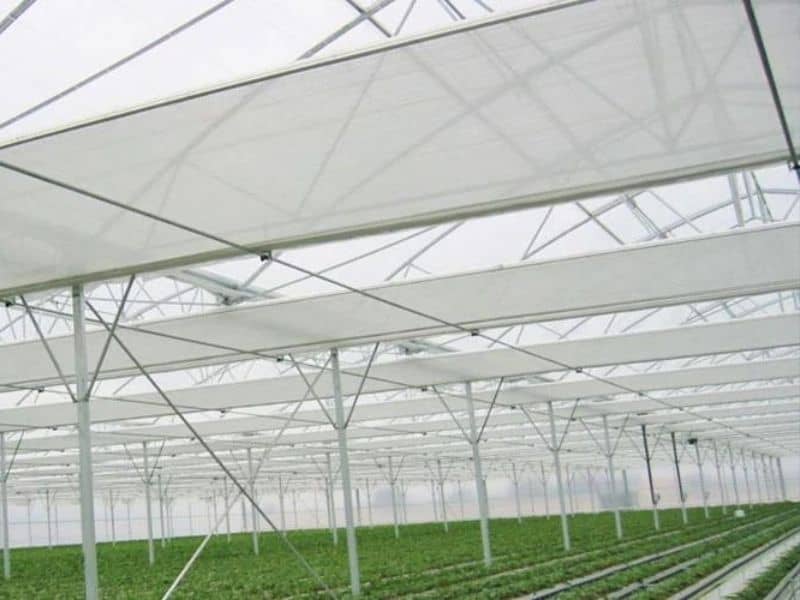
Diffusion Shading Screen(DSS), also called Light Diffusion Screens, is an innovative climate solution screen to improve the light combination from different angles, scatter to plants and enhance the growth of crops.
The basic function is to block direct sunlight and adjusting the indoor temperature. On a cold night, it can prevent the loss of indoor temperature, play the role of energy-saving.
We will contact you within 1 working day, please pay attention to the email with the suffix “@eyouagro.com”.
A controlled microclimate is necessary for maximum plant growth and production. Some plants such as tomatoes and strawberries need more sunlight than others.
These different light and heat requirements can be met by installing an aluminet of the required density to regulate the sunlight entering the field.
Follow the guide to generate more revenue, as research has proved that proper shading improves fruit quality, which generated more high revenue.
Table of Contents
What is Aluminet?
Aluminet is a metalized screen that reflects the long-wave length infrared radiations and stops them from entering or leaving the field. It is mostly used in greenhouses and nurseries to regulate the optimum temperature required for the crops. Its open weave structure allows better ventilation, and moisture to pass through than the solid screens,diminishing the humidity inside the area.
What are the Different Types of Aluminet?
As the usage of the Aluminet depends on the environmental conditions so different grades of Aluminet have been developed, ranging from 30% shade to nearly 80% shade, each of which has its own usages.
The different types of Aluminet areas under:
- 20% to 30% Aluminet
- 30% to 40% Aluminet
- 40% to 50% Aluminet
- 50% to 60% Aluminet
- 60% to 70% Aluminet
- 70% to 80% Aluminet
- 80% to 90% Aluminet
- 90% to 99% Aluminet
Note: One of the Caveats to Notice is that the Diffused Light Decreases as the Density Increases
· 20% to 30% Aluminet: Plants, including but not limited totomatoes, Gooseberries, etc. that are most tolerant to heat or need more heatare to be covered by this type of Aluminet.
· 30% to 40% Aluminet: Most of the Aluminet in this range is used for more heat-tolerant plants such as roses, strawberries.
· 40% to 50% Aluminet: Lilies and Vegetables are protected mostly by making use of this range of Aluminet.
· 50% to 60% Aluminet: This type of Aluminet is used for moderate pressure environments and it can be used for plants including Orchids,Pot plants.
· 60% to 70% Aluminet: This range is suitable for orchidsof the type Oncidiums.
· 70% to 80% Aluminet: It is used for plants including Ferns, Philodendron that is most prone to heat damage and are in heavy heat climates.
· 80% to 90% Aluminet: This type of netting is suitable for Coffee, Tea.
· 90% to 99% Aluminet: These are usually employed for usages other than agriculture such as vehicular shading.
A 30% density Aluminet provides around 72% diffused light where as a 70% Aluminet provides only about 45%.
A mixture of Aluminet, having different Aluminet densities, has usually been advised as it is the most cost-effective method. Having multiple options is often the best strategy.
Why is Aluminet Important for Plants?
Heat control and the energy conversation are the main fronts where aluminet is important for plants.
Since aluminet first came out around 20years, it has evolved tremendously, and the modern generations are so designedthat they are environment friendly, and enable to protect crops against harmful environmental agents such as UV rays.
Contrary to traditional shade clothes, and also the solid screens, aluminet is build paying special attention to cater tothe proper ventilation needs of the field.
Note that aluminet is not the product forhot climates only. To get it simple, it functions as a mirror, that does not allow the ceratin heat rays, the IR radiations, to pass through. This property is important in trapping the heat inside the greenhouses to conserve energy inthe colder regions.
Aluminet also protects the fruits from sunburn. In turn, the fruits are high-quality that bring in more value.
Last but not the least, the Aluminet O has a tough build to endure high-speed winds and weather oddities.
Benefits of Installing Aluminet:
Most of the benefits of using Aluminet areas under:
· Allowed better ventilation and moisture permeability
· Controls temperature
· Long-lasting
· Impervious to deteriorating atmospheric conditions
· Easy to set up
· Safeguards plants from UV rays, and extreme weather condition
· Allows the low-angled light to pass through, and distributes it equally to all plants, even at the time of little light as dawn and dusk.
Where is Aluminet Most Commonly Used?
The common use of the aluminet is in nurseries and greenhouses to manage the temperature and maintains it in the range required for the crop.
Though the two kinds of the aluminet,Aluminet ‘O’, and Aluminet “I” were tagged to be for outdoors, and indoors respectively, both are used outdoors.
But there is no limit to creativity. As aluminets are also being used to cover the cars, and in other settings such as fish farms to provide shade.
6 Steps on How to Choose Aluminet for Your Farms/Fields.
The most important things to consider while choosing an Aluminet are as under
Step 1.
The environment, and atmospheric pressure, will mostly dictate the choice of Aluminet. If the farm is in a colder region, ahigh-density shade will do more harm than good as it will prevent most heat from reaching the plants.
Step 1a.
A low-density shade will make sure most heat and sunlight reaches the plants for optimum growth.
Step 1b.
A moderate density shade is most useful for normal temperature and moderate pressure situations.
Step 1c.
High pressure or high-temperature solutions require thata high-density shade is employed, but it should be used for a number of days ata time only; otherwise, the plants might get starved.
Step 2:
Looks for the quality of the material.
Step 3:
Check if the aluminet is knitted or woven. Knitted are preferred since they are lighter than woven.
Step 4:
Check if the short listed option aligns with your budget.
Step 5:
Make sure that the netting size is compatible with the area of your garden.
Step 6:
Check if the material is UV protected. If not, it will eventually degrade and would not last long.
Note: For plants like tomatoes that need hotter conditions, you would probably need a low-density Aluminet whereas, for those as cucumber, colder conditions are required; thus high-density aluminet would be required.
How to Install Aluminet?
The installation process for Aluminet issimple and involves the following steps.
Step1.
Erect up the tunnel or the canopy around the greenhouse/ field which you want to cover.
Step 2.
Make sure there is support on all sides ofthe field/farm.
Step 3.
The middle line of supports is often most important in the canopy building of the farms. It needs to be secured so that the Aluminet remains fixed over it.
Step 4.
If you have a custom-size aluminet made, start fastening it to the screws via the holes at the end of the Aluminet.
Step 5.
Run a wire from corner to corner of the field in order to provide an ‘X’ shape base for the Aluminet where it can rest.
Step 6.
Fasten it to the supports from all of the sides with the help of taut knots and then erect the Aluminet over the top of the canopy or the tunnel.
Tips for Aluminet:
Dos:
Carry out proper maintenance especially if the Aluminet is being used consistently in aseason; look for tears and to prevent possible fraying.
Do secure it tight using hooks and clamps to prevent it from swaying in the wind.
Do have extrasupport in the middle so that the Aluminet does not sag in the middle
Do maintain a scheduled up keep program to prevent the Aluminet from getting too many tears.
Don’ts
Don’t underestimate the energy efficiency provided by the application as it increases energy efficiency up to 17%.
Don’t use a high-density shade in low sunlight areas, as the plants will starve due to not having enough sunlight.
Don’t Buy Aluminet in the summer as the prices rise steeply during the time, consider getting an estimate in the winter and making a purchase in the same season.
Don’t Block off ventilation vents with the Aluminet; having a well-regulated ventilation system is ideal.
Don’t Skip on watering plants twice a day on hot summer days even with the shade, as the effect of humidity might damage the plants.
How to Import Aluminet from China?
Following steps can be followed to import Aluminet from China:
Find the best places to find Aluminet by using google, Alibaba.
Communicate with the manufacturers.
Take a tour of the different companies providing the Aluminet.
Consider the factors which might affect your decision before placing the order.
Negotiate the price and then place the order.
Inspect the sample of the product and make a final payment.
Use a method of importation that is most aligned to your specific needs.
Track your product and when you do get it, then inspect it and check for a warranty.
EyouAgro offers the most balanced costsfor its products and even facilitates the importation process. We do business according to Incoterms and maintain a high level of standard. On ordering from EyouAgro, we will also help you with the importation process and help you negotiate the costs for importation as well.
Contact and Buying:
Various methods can be used for contactand buying:
● Leave us amessage at our website (URL: https://eyouagro.com/contact-us/).
● Email usat: info@eyouagro.com
● Drop acall: +8613816514856
Conclusion
In conclusion, EyouAgro’s Aluminet is the best choice you can make to protect your plants, be those in fields, farms, or greenhouse. It provides the most complete solution to your management needs, be that humidity-related, temperature-related, or otherwise. Do you want your plants to die due to drying up in summer and starvation in winter? If no, then consider using the best heat management solution in the market: EyouAgro’s Aluminet.

CERTIFICATIONS
EYOUAGRO Repsects Quality Standards
